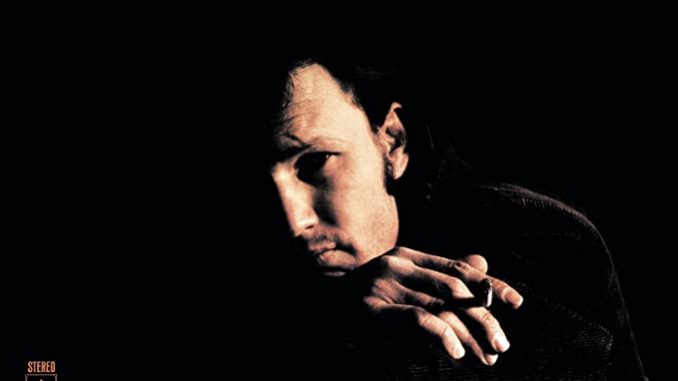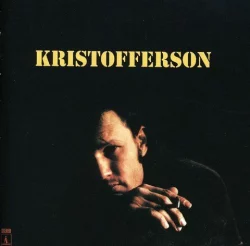
 As the swinging sixties with its mantra of peace and love disintegrated into the splintered seventies of disillusion, suspicion, and violence, an ex U.S. Army Captain would become the most unlikely of saviours with the songs on his debut album helping to unite both the growing divide between the generations and the simmering tensions between the country music of old Nashville and the new outlaw movement desperate to be heard. This however was no overnight success. Having decided to turn his back on a prestigious role at West Point, Kris Kristofferson would spend the next four years trying to finance his dream to become a songwriter with a varying range of jobs which would include helicopter pilot, a skill he gained whilst in the army and a job he would lose due to his drinking, to janitor at Columbia Recording Studios in Nashville. During this time he would suffer the break up of his marriage, and family disownment, a price he had to pay to follow his dream. His perseverance would finally pay off as his songs began to gain chart success for such artists as Roy Drusky, Ray Stevens, Jerry Lee Lewis and Roger Miller, which led to established Nashville songwriter Bobby Braddock introducing him to Fred Foster at Monument Records. Foster was suitably impressed to sign Kristofferson as a recording artist and set about putting his debut album together using a mix of new compositions along with songs that others had already had success with, whilst choosing to record with a small group of ‘non A-list’ session men and a liberal sprinkling of strings. The end result was an album that allowed the spotlight to focus totally on the lyrics and the poetic storytelling within the narrative of each song that ranged from talking blues, tender ballads and unhinged jams.
As the swinging sixties with its mantra of peace and love disintegrated into the splintered seventies of disillusion, suspicion, and violence, an ex U.S. Army Captain would become the most unlikely of saviours with the songs on his debut album helping to unite both the growing divide between the generations and the simmering tensions between the country music of old Nashville and the new outlaw movement desperate to be heard. This however was no overnight success. Having decided to turn his back on a prestigious role at West Point, Kris Kristofferson would spend the next four years trying to finance his dream to become a songwriter with a varying range of jobs which would include helicopter pilot, a skill he gained whilst in the army and a job he would lose due to his drinking, to janitor at Columbia Recording Studios in Nashville. During this time he would suffer the break up of his marriage, and family disownment, a price he had to pay to follow his dream. His perseverance would finally pay off as his songs began to gain chart success for such artists as Roy Drusky, Ray Stevens, Jerry Lee Lewis and Roger Miller, which led to established Nashville songwriter Bobby Braddock introducing him to Fred Foster at Monument Records. Foster was suitably impressed to sign Kristofferson as a recording artist and set about putting his debut album together using a mix of new compositions along with songs that others had already had success with, whilst choosing to record with a small group of ‘non A-list’ session men and a liberal sprinkling of strings. The end result was an album that allowed the spotlight to focus totally on the lyrics and the poetic storytelling within the narrative of each song that ranged from talking blues, tender ballads and unhinged jams.
The opening track ‘Blame It On The Stones’ stumbles unapologetically from the speakers with a ramshackled, unkempt feel as it challenges the negative perception the older generation had of the Rolling Stones, quoting from the the band’s song ‘Mother’s Little Helper’ within the narrative, and in doing so immediately planting an army sized footprint on the ‘youth culture’ side of the generational divide with its ‘outlaw country’ vibe. This is followed by ‘To Beat The Devil’ with its spoken intro dedicating the track to Johnny Cash who had been, and would continue to be, one of Kristofferson’s greatest supporters. The track inhabits a familiar tale of the struggling songwriter confronted by the devil at a bar whilst structurally wrapped in a simple traditional talking blues metre allowing the internal turmoil of the protagonists to take centre stage. Kristofferson’s vocal range may have been somewhat limited, he was once quoted as saying, “I can’t sing, I sound like a frog”, but his delivery revealed an integrity and intimacy that helped him communicate with the listener in a way few have bettered. This was undoubtedly helped by the poetic soul and lyrical sagacity by which he wrote having as young man won a Rhodes Scholarship to Oxford University, studying at Merton College and graduating with a B Phil degree in English literature.
Track three ‘Me And Bobby McGee’ is one of the finest and most covered songs in popular music history and very possibly the definitive road trip song as it tells the tale of two young lovers hitch-hiking their way from Baton Rouge to New Orleans. Described as a country song at the start of the track in truth this song transcends genres because the instrument accompaniment, including here some fine harmonica playing from Charlie McCoy, is in essence superfluous to the lyrical imagery that the poetic narrative conjures so vividly. Roger Miller was first to recognise the commercial heart of this song taking it to number 12 in the country charts, while Janis Joplin’s high-energy version that was released posthumously would reach number 1 on the Billboard Chart, both fine versions but neither capturing the emotional integrity or the aching loss that Kristofferson’s gravelled, road-weary voice so effortlessly delivers. The following track, ‘The Best Of All Possible Worlds’, was inspired during an altercation with the law which found Kristofferson thrown in jail for an alcohol offence. Whilst there he witnessed the mistreatment of black people, as well as the poor, by the local police and set about putting what he observed to song. This uptempo number would not be the last time he would challenge the unfair treatment by the police endearing himself to the counterculture movement.
‘Help Me Make It Through The Night’, is track five and another song which has passed into contemporary music folklore being covered by such artists as Gladys Knight, Elvis Presley, Glen Campbell, Joan Baez, and Sammi Smith who would take the song to the top of the charts and remain the best-known version in the U.S. The title came from a comment that Frank Sinatra made responding to a question during an interview with ‘Esquire’ where he was asked what he believed in and replied “booze, broads or a bible… whatever helps me make it through the night” The song itself tells the tale of a one night stand but the intimacy conveyed in the lyrics and the tenderness with which they are delivered lifts the subject matter from simply one of sex to that of the desperate need for love and companionship. This is followed by another song that throws the spotlight on the abuse of power by those employed to keep the peace with ‘The Law Is For Protection Of The People’ pulling no punches as it scathingly attacks the police officers guilty of discrimination. Kristofferson returns to matters of the heart for ‘Casey’s Last Ride’, as he tells the tale of a lonely man reminiscing over a former lover with a forlorn sense of longing. It is here that the arrangement leans more towards the strings from the predominant use of guitar and bass as the melody subtlety shifts in tempo. The melancholy feel continues with ‘Just The Other Side Of Nowhere’ torn between chasing his dreams and all he must give up in pursuit of that which for ever seems out of reach. Throughout the changing themes Kristofferson’s lyrics continually maintain an intense focus on the deeper aspects of the human condition rarely matched before or after.
For track nine Kristofferson turns his focus to the tragic tale of Cecil Darby in ‘Darby’s Castle’ before returning to matters of the heart on the timeless classic ‘For The Good Times’, a song that had earlier that year been a chart hit for Ray Price before the release of the album. Like many of his songs it was based on a real life experience, conveying as it does all the emotional turmoil of sadness, acceptance and longing. ‘Duvaliers Dream’ with its orchestrated intro is the penultimate track on the original album and tells the tale of a character living in isolation until he discovers love and reconnects with society. The closing number ‘Sunday Morning Comin’ Down’ is possibly one of the finest songs ever written as it graphically depicts Kristofferson’s world spiralling out of control during the years prior to the album’s release. During this period he found himself divorced, fired from his job and living alone in a small apartment, his dreams of becoming a successful songwriter nothing more than a distant mirage. The detail in the narrative conjures an imagery that is so personal and self-effacing without ever being over indulgent or mawkish elevating what it was possible to say in a country song to a new level. Johnny Cash took the song to the top of the Billboard Chart and said “I could see myself in every word”, while countless other covers would cement its place in the pantheon of the great songs of the genre.
On its release the Baltimore Sun said “On this album if you’re going to list all the great songs, you’d list all the songs”, and in truth all the songs are great, but to have four on a debut album that are now woven into the tapestry of popular music of the twentieth century is quite unique. That it was also able to sit so comfortably within two opposing musical camps finding the natural affinity between the country music archetype of hard drinking, romantically independent loser and the rock ‘n’ roll archetype of the drug taking romantically free hippie was a triumph for the sympathetic old school production and the perseverance of a modern day poetic genius. This is one album that truly encompasses all that a ‘Classic Americana Album’ should be and deserves to be in every serious music fans collection.



Perceptive write-up for his debut album–inspired me to go back and listen to it for teh first time in a long while.
Glad you enjoyed the article Mike, and really chuffed that it encouraged you go back and listen to the album.
ednaquillen@gmail.com